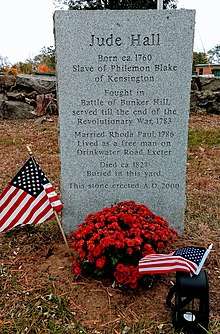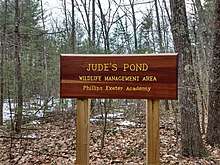Jude Hall
Jude (Judas) Hall was an African-American soldier in the American Revolutionary War. He served from 1775 to 1783, thus earning his freedom from slavery. After the war, he married and settled in Exeter, New Hampshire, where his homestead is still known as Jude's Pond. Three of his children were kidnapped and sold into slavery, and two of his grandsons fought in the American Civil War.

Military service
Jude Hall, of Exeter, New Hampshire, enlisted in May 1775 in the 3rd New Hampshire militia regiment and fought in the Revolutionary War under General Enoch Poor for eight years, earning his freedom from slavery.[1] He was profiled in William C. Nell's book Colored Patriots of New Hampshire, with Sketches of Several Distinguished Colored Persons in 1855, which states: "He was a great soldier and was known in NH to the day of his death by the name Old Rock."[2][3] Hall was possibly the most famous New Hampshire African-American patriot.[4]
Timeline
- May 10, 1775: Enlisted as a private in Jacob Hind's Company, 3rd New Hampshire Regiment.[5]
- June 17, 1775: Fought at Bunker Hill, thrown by nearby cannonball.[6]
- Nov. 1776: Re-enlisted in Clayes' Company, 2nd NH Regiment, for three years.
- 1777-1779: Saw action at Ticonderoga, Trenton, Saratoga, and Hubbardton. Was ill and recovered in Albany while his regiment continued on to Valley Forge. Fought at Battle of Monmouth, earning nickname "Rock". Served in the Sullivan-Clinton Expedition against the Iroquois on the southwestern fringes of New York state and eventually redeployed to guard the Hudson Highlands and the string of forts surrounding West Point.
- December 1779: Re-enlisted again, serving in Rowell's Company, 2nd New Hampshire.
- 1782 – 1783: Encamped at New Windsor along with the 1st New Hampshire, forming the New Hampshire Battalion.
- 1783: Discharged and returned to Exeter, NH.[7]
After his eight years of service, he finally received compensation in October 1786.
Family life

Hall lived his entire life in the Exeter area. "Jude's Pond", located on 70 Drinkwater Road in Exeter, New Hampshire, was his homestead as a free man and still bears his name.[8][9] The area is still quite wooded and lonely, but he successfully carved out a small home, which no longer stands. According to Bell's 1888 book, Hall was "a powerful man who could lift a barrel of cider and drink from it."
Jude married Rhoda (Paul), sister of Reverend Thomas Paul, in 1785 and they had a large family on Drinkwater Road.[10] Three of their sons (James, Aaron, and Wiliam) were stolen into slavery.[11] His eldest daughter Dorothy married Robert Roberts, butler to Massachusetts Senator Christopher Gore and author of House Servants Directory (published in 1827). Roberts gave affidavit testimony regarding 18-year-old James' abduction from his home on Drinkwater Road by an Exeter citizen, David Wedgwood (as described in the House Servant's Directory's 2015 edition "introduction xi" by Graham Russell Hodges).
Two of Jude and Rhoda's grandsons, Moses and Aaron, served in the Civil War.[12] Jude and Rhoda's nephew was the Exeter-born abolitionist poet James Monroe Whitfield.
In his history of the town of Exeter, published in 1888, Charles Henry Bell penned a memorable description of Jude Hall as "a man of powerful physique...it is said that the parts of his ribs which are usually cartilaginous were of solid bone, so that his vital organs were enclosed in a sort of osseous case."[13] According to Bell, Hall was the chief witness of the government in the trial of John Blaisdell for the 1822 homicide of another Exeter resident, John Wadleigh. Both were neighbors of Hall.
Hall died in 1827, and his actual gravesite is unknown. In 2000 a descendant of Hall's enslaver erected a memorial stone in his honor in the Winter Street Cemetery in Exeter.[14][15] Widow Rhoda moved to Belfast, Maine, to live with her daughter Mrs. Rhodia Cook. Rhoda died February 21, 1844 in Belfast.[16]
References
- Pruitt, Sarah (Jan 8, 2019). "He Fought for His Freedom in the Revolution. Then His Sons Were Sold Into Slavery". History Channel. 2019 A&E Television Networks. Retrieved 3 April 2019.
- Nell, William C. (1855). "The Colored Patriots of the American Revolution, with Sketches of Several Distinguished Colored Persons. Electronic Edition 1999". University of North Carolina at Chapel Hill. p. 119. Retrieved 25 January 2019.
- Kaplan, Sidney & Emma (1989). The Black Presence in the Era of the American Revolution (The book is a revised and expanded edition of the authors' classic catalog that accompanied a pioneering exhibition mounted in 1973 by the National Portrait Gallery. ed.). Univ of Massachusetts Press. pp. 60–61.
- Dixon, David T. (Spring 2007). "Freedom Earned, Equality Denied". Historical New Hampshire. NH Historical Society. 61 (1): 28–47. Lay summary (PDF).
- Thorenz, Matt (24 February 2013). "African Americans at New Windsor: Private Jude Hall, 2nd New Hampshire Regiment". Teaching the Hudson Valley. Retrieved 18 April 2019.
- "Roster of New Hampshire Soldiers in the Battle of Bunker's Hill June 17, 1775" (PDF). National Park Service, Dept of Interior. Retrieved 25 January 2019.
- "Patriots of Color at the Battle of Bunker Hill" (PDF). National Park Service. This curriculum-based lesson plan is one of a thematic set on the American Revolution using lessons from other Massachusetts National Parks. "Boston National Historical Park" Jude Hall. p. 15. Retrieved 25 January 2019.
- "PEA Walking Trail Map showing Jude's Pond" (PDF). Town of Exeter NH.
- "town map". google maps.
- Knowlton, Deborah (23 February 2018). "Jude Hall". NH Black Heritage Trail. Retrieved 25 January 2019.
- Rimkunas, Barbara (27 February 2014). "Jude Hall and His Family". Exeter Historical Society. Retrieved 18 April 2019.
- Rimkunas, Barbara. "Jude Hall" (video). Exeter Historical Society.
- Bell, Charles Henry (1888). History of the Town of Exeter, New Hampshire. Press of J. E. Farwell & Company, Boston.
jude hall osseous.
Boston: J.E. Farwell & Co., 1888 - Thorenz, Matt (24 February 2013). "African Americans at New Windsor: Private Jude Hall, 2nd New Hampshire Regiment". Teaching the Hudson Valley. Retrieved 18 April 2019.
- Rimkunas, Barbara (24 September 2018). "Exeter History Minute - Jude Hall". Exeter Historical Society "History Minute" video series.
- Pinette, Megan (February 2000). "Black Families of Belfast". The Waldo Independent newspaper (A Ramble Through Time series).
- House Servant's Directory by Robert Roberts, published 1827 by Monroe and Francis of Boston (Jude Hall story in introduction xi by Graham Russell Hodges 2015 edition)